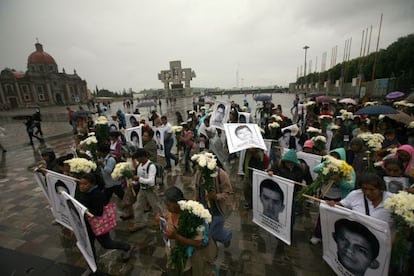Forensic experts fail to identify remains of missing Iguala students
Austrian scientists say bodies were too badly burned to obtain sufficient DNA


Investigators from the University of Innsbruck in Austria have been unable to identify human remains believed to belong to the 43 students who went missing in Iguala, after they failed to find sufficient usable DNA, Mexican officials said Tuesday.
The latest failure means the possibility of trying to identify the students who were kidnapped and massacred in southern Mexico during a confrontation last September is growing ever more remote.
“Routine methods cannot be used for a successful analysis,” said the Mexican prosecutors in a statement on Tuesday.
Police found 17 sets of remains in trash bags submerged in a river. But only one fragment could be positively identified as belonging to one of the students, 21-year-old Alexander Mora Venancio. The rest of the remains, which were badly burned, were taken to the Austrian university to undergo further sophisticated forensic testing.
The mayor of Iguala and his wife are among the more than 100 people arrested in connection with the deaths
Gunmen executed their victims at a trash dump and then burned the bodies in a bonfire. Scientists said they were unable to obtain sufficient genetic material because the mitochondrial DNA was destroyed when the bodies were burned.
On September 26, police in Iguala, Guerrero state, confronted students who tried to protest at a political rally organized by the wife of the town’s mayor. Six people were killed in the skirmish and 43 students were kidnapped.
Iguala Mayor José Luis Abarca and his wife María de los Ángeles Pineda Villa were among the more than 100 people arrested and charged in connection with their deaths.
According to witnesses, police turned the kidnapped students over to hitmen from local cartel Guerreros Unidos.
The students were shot in the back of the head and their bodies were cremated at a trash dump in the town of Cocula.
Despite the unsuccessful DNA tests, the Mexican government believes there is still a chance to identify the victims. The University of Innsbruck has said it will use a new technology known as Massively Parallel Sequencing (MPS) that has been successfully used to identify remains in the past.
“The biggest risk,” said scientists, “is that all the DNA extracts will be consumed without any additional results.”
Other countries, such as the United States and Germany, have offered to send forensic experts to Mexico.
The state of Guerrero is sitting on the brink as parents, human rights organizations and the entire nation demand answers over the missing students. Teachers unions, who support the parents, have carried out a series of violent protests over the past few months.
The state’s governor was forced to resign after the massacre, and some analysts question whether Guerrero can hold peaceful elections in June.
Tu suscripción se está usando en otro dispositivo
¿Quieres añadir otro usuario a tu suscripción?
Si continúas leyendo en este dispositivo, no se podrá leer en el otro.
FlechaTu suscripción se está usando en otro dispositivo y solo puedes acceder a EL PAÍS desde un dispositivo a la vez.
Si quieres compartir tu cuenta, cambia tu suscripción a la modalidad Premium, así podrás añadir otro usuario. Cada uno accederá con su propia cuenta de email, lo que os permitirá personalizar vuestra experiencia en EL PAÍS.
En el caso de no saber quién está usando tu cuenta, te recomendamos cambiar tu contraseña aquí.
Si decides continuar compartiendo tu cuenta, este mensaje se mostrará en tu dispositivo y en el de la otra persona que está usando tu cuenta de forma indefinida, afectando a tu experiencia de lectura. Puedes consultar aquí los términos y condiciones de la suscripción digital.








































